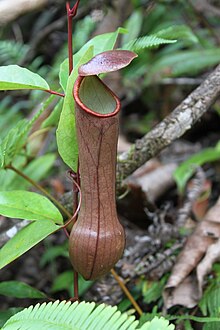Nepenthes distillatoria
| Nepenthes distillatoria | |
|---|---|
 |
|
| An upper pitcher of Nepenthes distillatoria from Sinharaja Forest Reserve, Sri Lanka | |
| Scientific classification | |
| Kingdom: | Plantae |
| (unranked): | Angiosperms |
| (unranked): | Eudicots |
| (unranked): | Core eudicots |
| Order: | Caryophyllales |
| Family: | Nepenthaceae |
| Genus: | Nepenthes |
| Species: | N. distillatoria |
| Binomial name | |
|
Nepenthes distillatoria L. (1753) |
|
 |
|
| Distribution of N. distillatoria. | |
| Synonyms | |
|
|
Nepenthes distillatoria (/nᵻˈpɛnθiːz dᵻˌstɪləˈtɔəri.ə/; from New Latin from Latin: destillo = to distill, -oria = adjectival ending; something from which a liquid is distilled, i.e., pitcher) is a tropical pitcher plant endemic to Sri Lanka. It was the second Nepenthes species to be described in print and the first to be formally named under the Linnaean system of taxonomy. It is therefore the type species of the genus.
Nepenthes distillatoria was the second Nepenthes species to be described in print, after N. madagascariensis. In 1677, Danish physician Thomas Bartholin made brief mention of it under the name Miranda herba, Latin for "marvellous herb". Three years later, Dutch merchant Jacob Breyne referred to this species as Bandura zingalensium, after a local name for the plant.Bandura subsequently became the most commonly used name for the tropical pitcher plants, until Linnaeus coined Nepenthes in 1737.
...
Wikipedia

